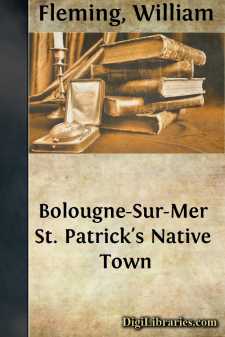Categories
- Antiques & Collectibles 13
- Architecture 36
- Art 48
- Bibles 22
- Biography & Autobiography 813
- Body, Mind & Spirit 142
- Business & Economics 28
- Children's Books 16
- Children's Fiction 13
- Computers 4
- Cooking 94
- Crafts & Hobbies 4
- Drama 346
- Education 46
- Family & Relationships 57
- Fiction 11829
- Games 19
- Gardening 17
- Health & Fitness 34
- History 1377
- House & Home 1
- Humor 147
- Juvenile Fiction 1873
- Juvenile Nonfiction 202
- Language Arts & Disciplines 88
- Law 16
- Literary Collections 686
- Literary Criticism 179
- Mathematics 13
- Medical 41
- Music 40
- Nature 179
- Non-Classifiable 1768
- Performing Arts 7
- Periodicals 1453
- Philosophy 64
- Photography 2
- Poetry 896
- Political Science 203
- Psychology 42
- Reference 154
- Religion 513
- Science 126
- Self-Help 84
- Social Science 81
- Sports & Recreation 34
- Study Aids 3
- Technology & Engineering 59
- Transportation 23
- Travel 463
- True Crime 29
Bolougne-Sur-Mer St. Patrick's Native Town
by: William Fleming
Categories:
Description:
Excerpt
ST. PATRICK'S PARENTAGE.
ABOUT the middle of the fourth century a noble decurion named Calphurnius espoused Conchessa, the niece of St. Martin of Tours. Heaven blessed their union with several children, the youngest of whom was a boy, who received at his baptism the name of Succath, which in the Gaelic tongue signifies "valiant."
Jocelin is responsible for the statement that the parents of the future Apostle of Ireland took, by mutual consent, the vow of celibacy after St. Patrick's birth, and that Calphurnius, like St. Gregory of Nyssa, St. Hilary, and St. Germanus, who were all married men, "closed his days in the priesthood" (chap, ii., p. 2). "There were thousands of priests and Bishops," as Dr. Dollinger observes, "who had sons before their ordination" ("History of the Church," vol. ii., p. 23, note).
There are others, however, like Father Bullen Morris, who are of opinion that St. Patrick's declaration in the "Confession" that his father was "a deacon" is a mistake on the part of the copyist for "decurion," and, as a proof of this contention, they point to the words made use of by the Saint in his Epistle to Coroticus, which is admittedly genuine: "I am of noble blood, for my father was a decurion. I have bartered my nobility—for which I feel neither shame nor sorrow—for the sake of others." It is difficult to reconcile this statement with the assurance given in the "Confession" that his father was a humble deacon. "It is inconceivable," as Father Bullen Morris argues, "that the Saint, sprung from a noble family, should base his claim to nobility on the fact that his father, Calphurnius, was a deacon. On the other hand, the theory that Calphurnius was a Roman officer fits in with both statements of the Saint" ("St. Patrick, Apostle of Ireland," p. 285, Appendix).
The same author gives another reason for calling in question this part of the text of the "Confession" in the "Book of Armagh." A scribe made an addition to the genealogy of St. Patrick as recorded in the Book, writing on the margin "Son of Odisseus"; and these words are actually introduced into the text by Dr. Whitley Stokes, in his edition of the "Confession," without either note or comment. It is easy to imagine, therefore, that ancient Celtic writers, with their passion for genealogies, should tamper with the ancestors of St. Patrick. Nicholson, a distinguished Irish scholar, was, of opinion that the addition "a deacon" was mere guesswork on the part of the copyist, and wrote "incertus liber hic"—"the book is here unreliable" ("St. Patrick, Apostle of Ireland," Appendix, pp. 286—288).
Moreover, if the word "a deacon" in the "Book of Armagh" is the true reading, it must surely be a matter for surprise that St. Patrick, who sternly enforced the law of celibacy in Ireland as part of the discipline of the Catholic Church, should describe himself as the son of a deacon without either comment or explanation, and more especially when we remember that the Council of Elvira, A.D. 305, and the Council of Aries, A.D....


